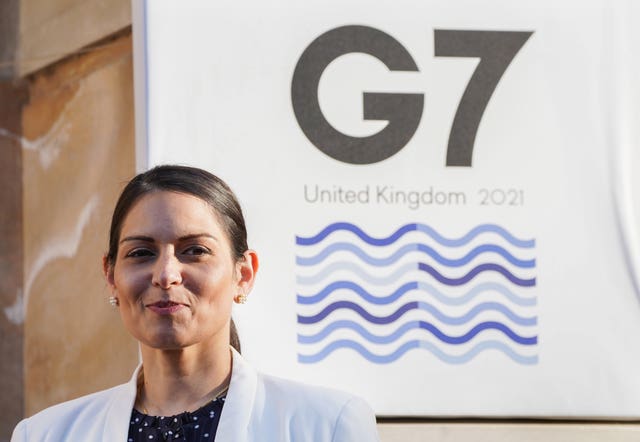
The Home Secretary has reportedly sanctioned new tactics to redirect migrant boats in the Channel back to France amid crunch talks over crossings.
According to reports, Priti Patel has ordered officials to rewrite maritime laws to allow Border Force to turn boats around, forcing them to be dealt with by French authorities.
It comes following a G7 interior minister’s meeting on Wednesday, during which Ms Patel told her French counterpart that the British public “expect to see results” from French efforts to prevent ongoing migrant crossings.
Several newspapers reported that members of Border Force are being given special training to handle migrant boats, but would only deploy the “pushback” tactics when deemed practical and safe to do so.
 A group of people thought to be migrants are brought in to Dover, Kent, aboard a Border Force vessel following a small boat incident in the Channel on Wednesday (PA)
A group of people thought to be migrants are brought in to Dover, Kent, aboard a Border Force vessel following a small boat incident in the Channel on Wednesday (PA)
Reports suggested such operations were likely to be restricted to sturdier, bigger migrant boats and only used in “very limited circumstances”.
READ MORE: Nigel Farage GB News report from English Channel branded 'revolting'
Ms Patel and the French interior minister, Gerald Darmanin, held discussions on crossings at Lancaster House in London, in the wake of hundreds of migrants being brought ashore in Kent over the past few days.
Government sources told the PA news agency the pair had a “constructive” meeting in which Ms Patel made clear tackling the number of people making their way from France to the UK on small boats was her “number one priority”.
But The Times reported that the French Government said the newly reported turnaround tactics would have “a negative impact on our co-operation”.
The paper also said Mr Darmanin had rejected a UK request to set up a joint command centre in northern France, with police and border force officers from both countries patrolling the coastline and the Channel.
It comes just days after Ms Patel is said to have told MPs she is prepared to withhold millions of pounds of cash promised to France to help step up patrols unless an improvement in the number of migrants intercepted by French authorities is seen.
Today I held constructive talks with French Interior Minister @GDarmanin on tackling illegal migration across the Channel.
I made clear that delivering results and stopping crossings were an absolute priority for the British people.#G7UK 🇬🇧 🇫🇷 pic.twitter.com/UHVxbvhjJK
— Priti Patel (@pritipatel) September 8, 2021
But a Government source said: “The Home Secretary was clear with the French interior minister that the British public expect to see results.”.
Earlier on Wednesday, Prime Minister Boris Johnson said efforts to stop the crossings depended “to a large extent” on the ability of the French authorities.
 Home Secretary Priti Patel discussed the matter with her French counterpart (Ian West/PA)
Home Secretary Priti Patel discussed the matter with her French counterpart (Ian West/PA)
According to the Home Office, 785 migrants arrived in the UK on Monday after making the journey from France in small boats, with several young children and a baby among them.
This is the second highest daily total of the year, following the single-day record of 828 people set last month.
READ MORE: Dundee priest Father Jim Walls raises £20,000 for Calais refugee charity
The crossings continued on Tuesday and Wednesday during the better weather conditions, with boats arriving at Dover and others being towed on to beaches along the south coast.
Earlier this year, the UK and France announced an agreement to more than double the number of police patrolling French beaches.
It was the second pledge of its kind in a year, in a bid to stop small boats from leaving France.
'Without a change of policy Priti Patel’s meeting is a lost cause. The Home Secretary can keep on spending public money, but nothing is going to change unless she is prepared to change her failed and unworkable policies' – @stevesymondsAI @ukhomeofficehttps://t.co/0XAQm04Yfr
— News From Amnesty (@NewsFromAmnesty) September 8, 2021
As part of the deal, the Government pledged to give France £54 million to support its efforts to stop small boat crossings.
Charities urged the Home Office to take a “more humane and responsible approach” towards asylum seekers and said humanitarian visas were needed to help “prevent the chaos of the Channel crossings”.
Pierre-Henri Dumont, who represents Calais in the French National Assembly, told BBC Radio 4’s Today programme: “Nothing can stop them.
“The fact is, we’ve got 300 to 400 kilometres of shore to monitor every day and every night and it’s quite impossible to have police officers every 100 metres because of the length of the shore.”
At least 13,000 people have now made the crossing to the UK in 2021, according to data compiled by the PA news agency.
According to the UK Government’s clandestine channel threat commander Dan O’Mahoney, efforts so far have prevented more than 10,000 migrant attempts, led to almost 300 arrests and secured 65 convictions.
Illegal migration is anticipated to be the subject of focus for the final day of the G7 meeting on Thursday.



Why are you making commenting on The Herald only available to subscribers?
It should have been a safe space for informed debate, somewhere for readers to discuss issues around the biggest stories of the day, but all too often the below the line comments on most websites have become bogged down by off-topic discussions and abuse.
heraldscotland.com is tackling this problem by allowing only subscribers to comment.
We are doing this to improve the experience for our loyal readers and we believe it will reduce the ability of trolls and troublemakers, who occasionally find their way onto our site, to abuse our journalists and readers. We also hope it will help the comments section fulfil its promise as a part of Scotland's conversation with itself.
We are lucky at The Herald. We are read by an informed, educated readership who can add their knowledge and insights to our stories.
That is invaluable.
We are making the subscriber-only change to support our valued readers, who tell us they don't want the site cluttered up with irrelevant comments, untruths and abuse.
In the past, the journalist’s job was to collect and distribute information to the audience. Technology means that readers can shape a discussion. We look forward to hearing from you on heraldscotland.com
Comments & Moderation
Readers’ comments: You are personally liable for the content of any comments you upload to this website, so please act responsibly. We do not pre-moderate or monitor readers’ comments appearing on our websites, but we do post-moderate in response to complaints we receive or otherwise when a potential problem comes to our attention. You can make a complaint by using the ‘report this post’ link . We may then apply our discretion under the user terms to amend or delete comments.
Post moderation is undertaken full-time 9am-6pm on weekdays, and on a part-time basis outwith those hours.
Read the rules hereLast Updated:
Report this comment Cancel